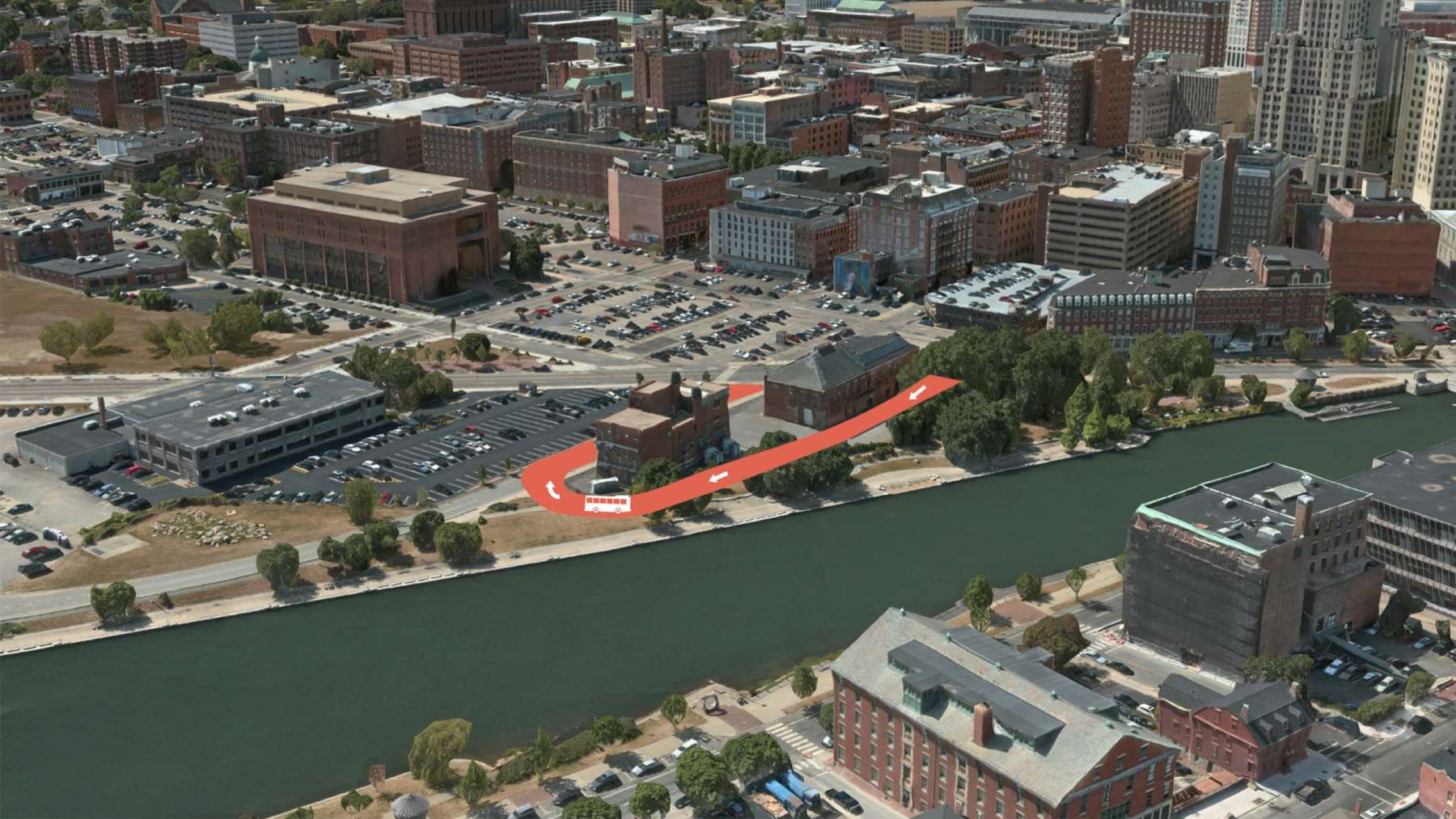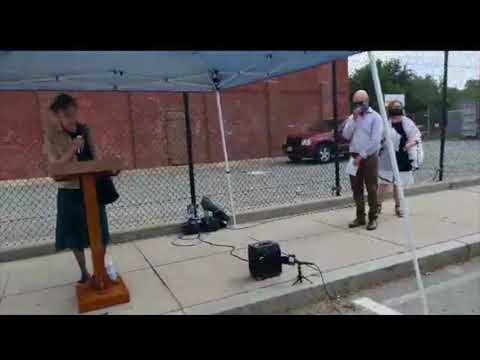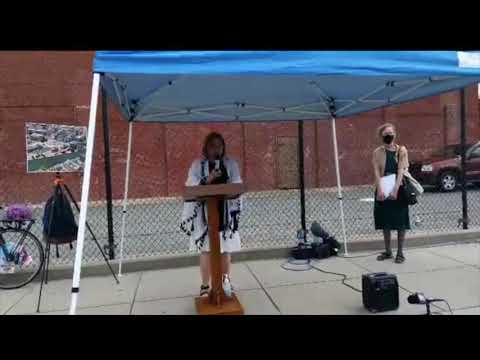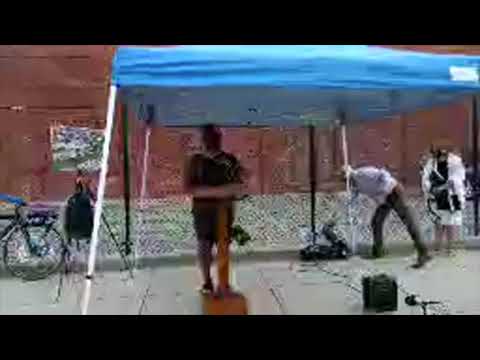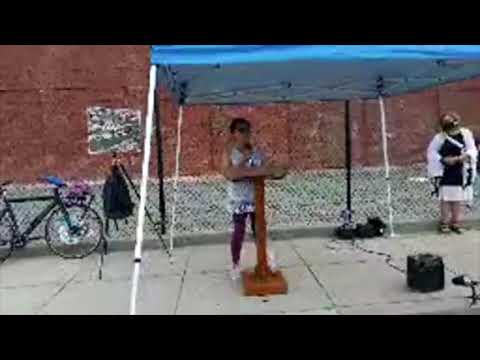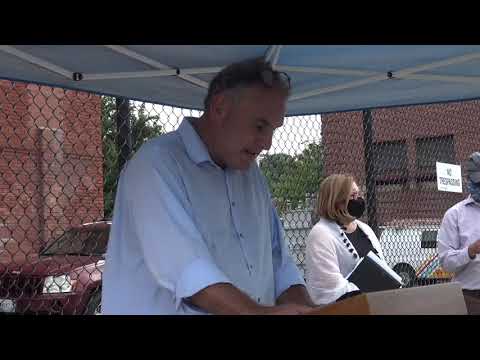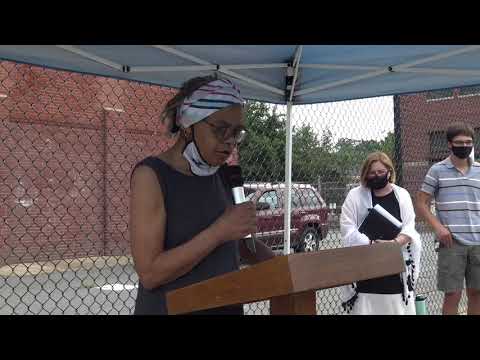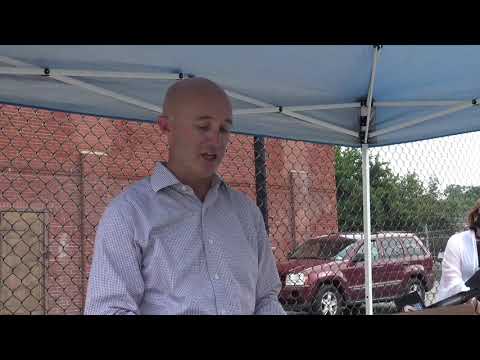Local transit advocacy groups and other orgs oppose RIDOT bus hub plan
“Splitting up Kennedy Plaza is going to be a big inconvenience to our every day RIPTA riders and anyone with a two hour transfer. Our seniors, folks with mobility issues, parents with little children, the working public – we depend on RIPTA. We depend on Kennedy Plaza…“ The Rhode Island Transit Riders Alliance joined with local organizations, including Grow Smart
August 25, 2020, 3:25 pm
By Uprise RI Staff
“Splitting up Kennedy Plaza is going to be a big inconvenience to our every day RIPTA riders and anyone with a two hour transfer. Our seniors, folks with mobility issues, parents with little children, the working public – we depend on RIPTA. We depend on Kennedy Plaza…“
The Rhode Island Transit Riders Alliance joined with local organizations, including Grow Smart Rhode Island, the Jewelry District Association and the Providence Preservation Society, at a press conference Tuesday morning to oppose the Rhode Island Department of Transportation‘s (RIDOT) proposed bus hub plan. Gathered on the riverfront land beside the vacant National Grid building on Dyer Street – the primary site in RIDOT’s multi-hub plan, community leaders and bus riders highlighted the lack of public input in the process as well as the decline in quality of service created by the proposed design. Opponents also noted the plan would disproportionately affect the elderly, disabled and minority populations that make up a majority of transit riders. The group called on RIDOT and Governor Gina Raimondo to put the needs of transit riders first and stop this flawed plan now.
See also: RIDOT faces strong opposition to multi-hub plan at public meeting

“We believe a strengthened mass-transit system can help reinvigorate the downtowns of our core cities, strengthen Rhode Islands economy, fight climate change͕ and improve the mobility, of the many Rhode Island residents who cannot or choose not to drive. But for public transit to help realize these goals, transit users must be fully in the loop and heard in public hearings as the plans are developed,” said Patricia Raub, chair of the RI Transit Alliance. “A plan initiated without the input of transit users and other members of the public is unlikely to succeed.
“The Dyer Street location͕ where RIDOT plans for the bulk of the buses to go, is too small to serve as the single downtown hub,” continued Raub. “It appears that the selection of this site has forced the development of the awkward and inconvenient multi-hub solution simply to accommodate the leftover buses.”
[Thank you to the Providence Streets Coalition for some of the video below]
To date, RIDOT has held no public meetings to listen to and incorporate input into the proposed hub plan. RIDOT claims there has been a public process, but has held nothing more than a few private meetings with so-called stakeholders to whom they presented their plan. A RIPTA board meeting last week brought dozens of people, all of whom voiced their opposition to the proposal. RIDOT has said they will move ahead in the coming weeks, regardless.
“Any design on how to allocate the $35 million transportation bond approved by taxpayers in 2014 should not be driven by artificial deadlines without the benefit of transparency, data and public input,” said Sharon Steele, president of the Jewelry District Association. “A building project of this magnitude, using public funds, that would relocate thousands of RIPTA passengers daily, requires more than a few weeks of public presentations. A legitimate public process should build public support, not catalyze widespread opposition.
“This proposed hub is adjacent to the State’s Innovation and Design District in the I-195 corridor,” continued Steele. “The waterfront park adjacent to this site was meant to provide a Gateway to this important business hub to nurture the new economy. This park was also designed to be an important public space where residents, workers and visitors alike would come together to live, work and play. By locating a transit hub with too small a footprint here, this valuable public asset will be limited to a single use and could limit investment in Governor’s signature economic development plan.”
“I’m a lifetime RIPTA rider,” said Terri Wright, Direct Action for Rights and Equality and Racial and Environmental Justice Committee of Providence. “Splitting up Kennedy Plaza is going to be a big inconvenience to our every day RIPTA riders and anyone with a two hour transfer. Our seniors, folks with mobility issues, parents with little children, the working public – we depend on RIPTA. We depend on Kennedy Plaza…”
“I’ve lived in this country for 25 years, and I’ve used RIPTA almost every single day,” said Edilberta Tejas, who works at the Providence Community Library. Saying that she’s lucky to only take two buses, one in the morning and one in the evening to get to work, Tejas, noted that there are people who have two take two or even three buses for their commute. “How about the mothers who carry one child, two children – with so many things on?”
“This is no way to build back a ‘better normal’ for those of us who rely on transit to get to work and essential services,” said John Flaherty from Grow Smart Rhode Island. “We call on RIDOT to withdraw its third in a series of flawed and inadequately vetted proposals and engage with stakeholders and riders to strengthen, not weaken our transit system.”
Transit riders speaking at the event spoke of being left out of the decision process entirely, while RIDOT pushes the proposal forward without input from Rhode Islanders who use the bus for work, medical appointments, school, visits with family, and much more. The riders also indicated having multiple hubs with longer walks and more transfers which may slow their necessary commutes and add a significant burden onto riders. Riders believe the $35 million in transit bonds should be spent to improve services, not degrade them.
“This civic amenity should enhance the riders͛ experience͕ including on-site amenities and easy to navigate routes. Most importantly, our transit system investment should be focused on creating an asset the state and riders can rely on for decades to come,” Flaherty said͘.
“As a bus rider I’m very disappointed in the state’s most recent plan,” said Rochelle Lee, a former RIPTA board member and member of the Rhode Island Transit Riders. “I’m disappointed that the voices of the every day taxpayer that happens to ride a bus has been ignored.”
Brent Runyon, Providence Preservation Society read a letter from Councilwoman Helen Anthony
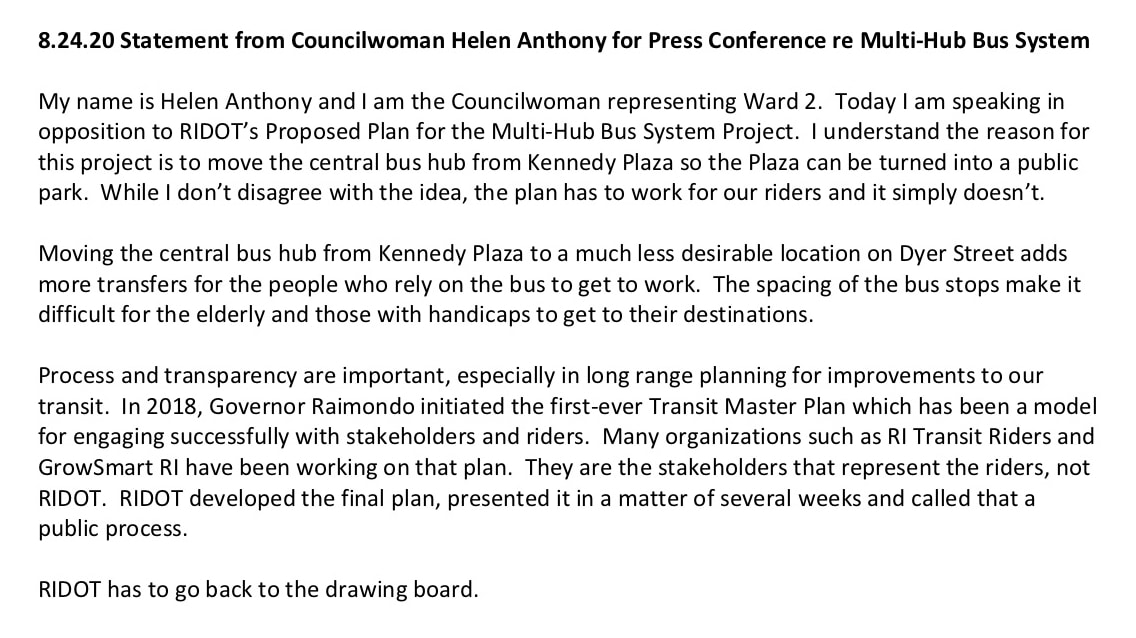
Patricia Raub closed things out:



